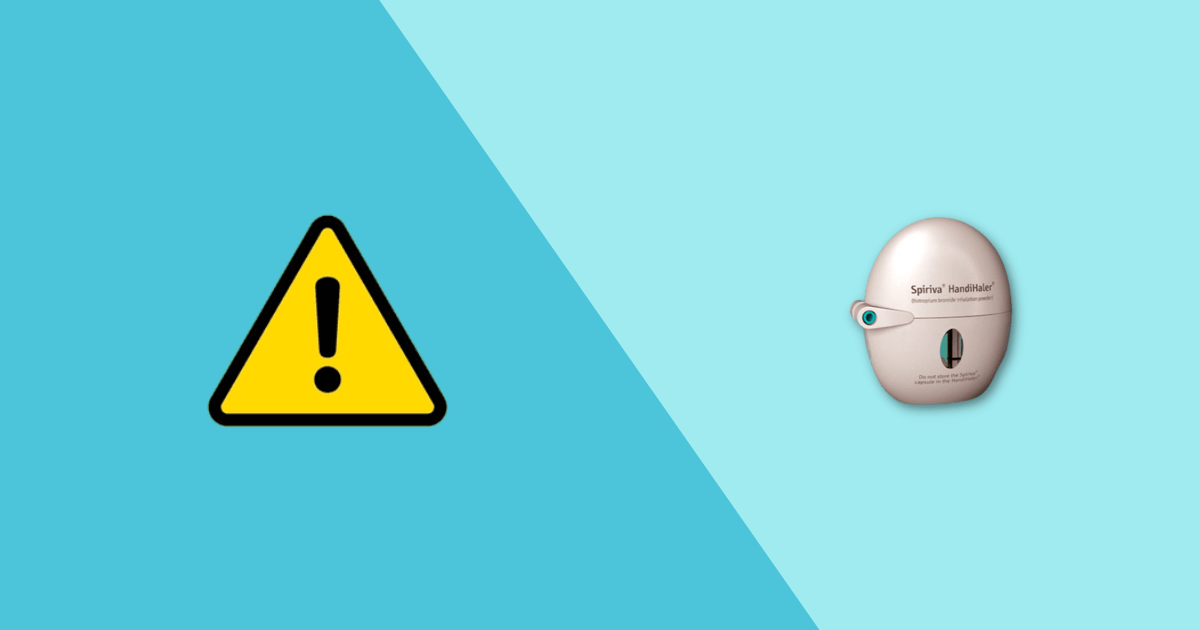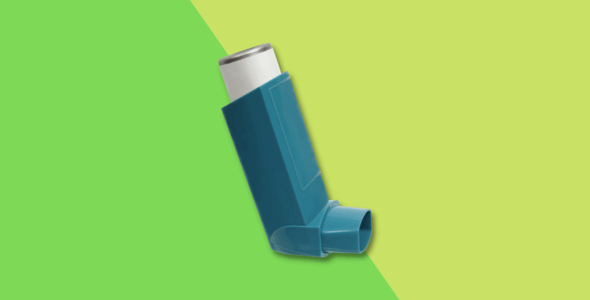Spiriva side effects and how to avoid them
Table of contents
Spiriva is an FDA (U.S. Food and Drug Administration) approved medication manufactured by Boehringer Ingelheim Pharmaceuticals, Inc. It is classified as a long-acting muscarinic antagonist (LAMA) and is used to treat chronic obstructive pulmonary disease (COPD). While Spiriva is generally well tolerated, there are some potential side effects that people should be aware of. The most common side effects of Spiriva include upper respiratory tract infections. Less common but more serious side effects can include serious allergic reactions.
Learn more about the side effects of Spiriva and what you can do to avoid them.
What is Spiriva (tiotropium)?
Spiriva is an anticholinergic bronchodilator indicated for:
- The long-term, once-daily, maintenance treatment of bronchospasm associated with chronic obstructive pulmonary disease (COPD) and for reducing COPD exacerbations. (COPD includes chronic bronchitis and emphysema)
- The long-term, once-daily, maintenance treatment of asthma in patients 12 years of age and older. Spiriva Respimat is indicated for the relief of acute bronchospasm.
Spiriva dosage
Spiriva is available in capsule form containing 18 mcg of tiotropium powder for oral inhalation using a Handihaler device. Do not swallow the Spiriva capsules. Use two inhalations of the tiotropium powder once daily.
Spiriva is also available as Spiriva Respimat in an inhalation spray form in doses of 1.25 mcg or 2.5 mcg tiotropium per actuation.
Spiriva Respimat or Spiriva Handihaler devices are not rescue medicines and should not be used for treating sudden breathing problems or for sudden asthma symptoms.
Please read the prescribing information and the medication guide for the complete drug information. Always speak with a healthcare professional for medical advice or any changes to your dose so they can monitor and evaluate your condition. Store this medicine at room temperature away from moisture and heat, and do not freeze.
Spiriva side effects
The most common possible side effects of Spiriva include:
- Pharyngitis
- Bronchitis
- Headache
- Upper respiratory tract infection, dry mouth, sinus infection, sinusitis, cough, sore throat
- Non-specific chest pain
- Urinary tract infection, painful urination
- Indigestion
- Constipation
- Increased heart rate
In rare instances, Spiriva can cause more serious long-term side effects. These can include:
- Immediate hypersensitivity reactions – angioedema, hives, bronchospasm, or anaphylaxis
- Paradoxical bronchospasm which may be life-threatening – coughing, difficulty breathing, shortness of breath
- Worsening of narrow-angle glaucoma
- Blurred vision, eye pain or redness, seeing halos around lights
- Worsening of urinary retention
- Eye pain, swelling, redness, vision changes, blurred vision
If you experience any of these serious side effects, stop taking Spiriva and seek medical attention immediately. You are encouraged to report the negative side effects of prescription drugs to the FDA. Visit www.fda.gov/medwatch, or call 1-800-FDA-1088.
Does Spiriva cause anxiety?
Anxiety is not a side effect associated with using Spiriva. Speak to your doctor for medical advice if you experience this side effect.
Does Spiriva cause weight gain?
Weight gain is not a side effect of using Spiriva to treat asthma or COPD. Speak to your doctor if you have concerns while using Spiriva.
Does Spiriva cause coughing?
Yes. Common side effects of Spiriva include sore throat, dry mouth, coughing, and sinus infection.
Spiriva drug interactions
Spiriva can interact with other medications, including:
- Anticholinergics
- Bronchodilators
- Treatments for depression, anxiety, mood disorders, or mental illness
- Treatments for Parkinson’s disease
- Treatments for stomach problems, motion sickness, or irritable bowel syndrome
- Treatments for an overactive bladder
Before taking Spiriva, be sure to tell your doctor about all of the medications you are taking to ensure they are safe to take at the same time.
Spiriva contraindications
Don’t take Spiriva if:
- Are allergic to the active ingredient tiotropium bromide, ipratropium, or atropine
- Have had an allergic reaction to any of the other ingredients in Spiriva
- Are pregnant or are planning to become pregnant
Talk to your doctor before using Spiriva if you:
- Have an allergy to milk proteins
- Are taking any of the medications that could interact with Spiriva
- Have moderate to severe renal impairment
- Have narrow-angle glaucoma
- Have a milk allergy
- Have an enlarged prostate or urination problems
- Are breastfeeding or are planning to breastfeed
You should always check with your doctor or pharmacist before taking any medication, including Spiriva, to make sure it is safe for you.
How to avoid Spiriva side effects
The best way to avoid side effects is to take Spiriva as directed by your doctor. Follow your doctor’s instructions carefully, and do not take more or less than prescribed.
If you experience any side effects, talk to your doctor or pharmacist. They may be able to recommend ways to help reduce or prevent some of the side effects.
1. Stick to the recommended dosage
Take your prescribed dose of Spiriva that has been recommended by your healthcare professional. Do not take more or less than prescribed.
2. Monitor your blood sugar levels
If you have diabetes, it is important to monitor your blood sugar levels closely while taking Spiriva. Check your blood sugar levels as directed by your doctor and report any changes to your doctor immediately.
3. Drink plenty of fluids
Drink eight to 10 glasses of water or fluids every day to help prevent dehydration, which can make side effects worse.
4. Don’t skip meals
Eating regular meals and snacks will help to prevent low blood sugar levels (hypoglycemia).
5. Check your feet
If you have diabetes, check your feet for any cuts, sores, or redness regularly. Tell your healthcare provider if you experience any problems with your feet while taking Spiriva.
6. Know the signs and symptoms of Spiriva side effects
Signs and symptoms of side effects include upper respiratory tract infections and thrush. If you experience these symptoms, speak to your doctor for medical advice.
7. Tell your doctor about all medications you’re taking
Be sure to tell your doctor about all other medications you’re taking, including over-the-counter drugs, vitamins, and herbal supplements, as they can interact with Spiriva.
8. Get regular medical checkups
It is important to get regular medical checkups and monitor your medical conditions. Your doctor will monitor your condition and may adjust your dose of Spiriva as needed.
Medically reviewed
A medical professional has reviewed this article.


Jamie Winn, PharmD
Jamie Winn, PharmD
Dr. Jamie Winn received his Doctor of Pharmacy in 2002 from the University of South Carolina College of Pharmacy, Columbia, SC. Jamie is a medical reviewer for NiceRx.


